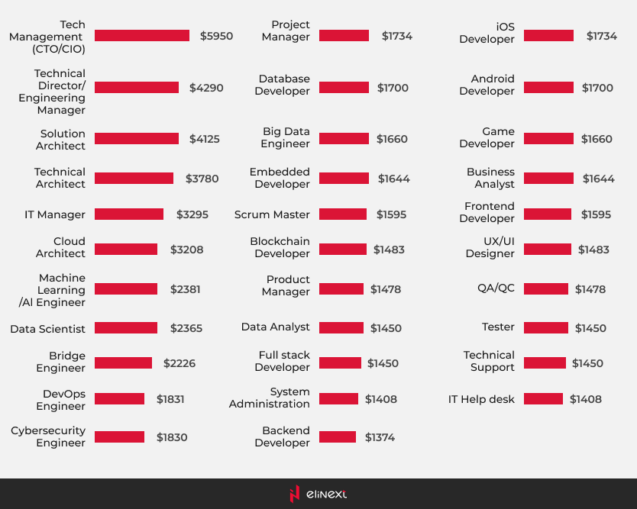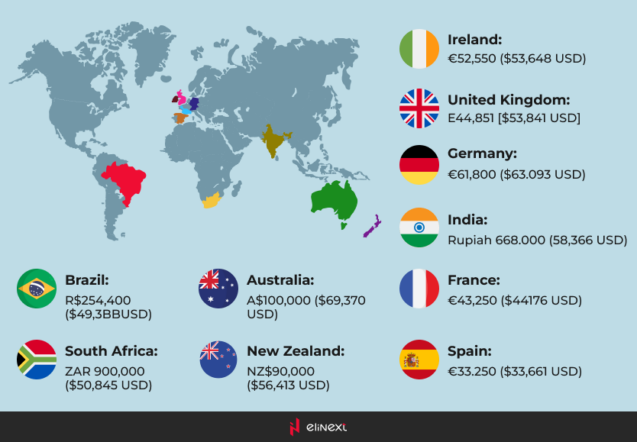One of the primary motivations behind organizations seeking to outsource their software development needs is cost savings. Down below, we’ll explore why thrifty CEOs intending to delegate IT projects are increasingly setting their sights on Vietnam.
Outsourcing is a strategic move that enables businesses to enhance their productivity in a cost-effective manner while entrusting their software development projects to skilled hands.
This proven approach offers companies the opportunity to cut costs on salaries and employee benefits and help save on the expenses associated with recruiting, training, and managing an in-house development team, which, in addition to being expensive, can also be labor-intensive.
Besides, external partners usually come equipped with the required tools and software, removing the necessity for organizations to make significant capital investments into infrastructure.
Due to the mentioned advantages, outsourcing has turned into one of the most popular business strategies in the 21st century — Deloitte stated that 65% of businesses engage in outsourcing for at least some aspects of their software projects.
Notably, the projected revenue for the IT outsourcing market is expected to hit US$512.50 billion in 2024. Industry observers foresee even greater prospects ahead, with revenue poised to demonstrate a compound annual growth rate (CAGR 2024-2028) of 10.99%, culminating in a market size of US$777.70 billion by 2028.
Now that we are talking so highly about outsourcing as a cost-effective solution, why choose Vietnam exactly?
Below, we will describe the compelling reasons behind picking this outsourcing destination. Read on.
How can outsourcing software development to Vietnam save money? These are 4 key ways.
-
Reduces pay overages
Outsourcing development projects to Vietnam has emerged as an increasingly popular solution to the problem of rising costs of software engineers, as it offers business owners the opportunity to access a skilled tech workforce at a lower cost.
According to Indeed, as of March 2024, the average salary for a software developer in Vietnam is 584 USD per month, meaning Vietnamese programmers get paid even less than their Indian counterparts who have long been considered the cheapest labor in the world of software development outsourcing.
Сompare the salaries of Vietnamese engineers with those of their colleagues from other in-demand IT outsourcing destinations, say, from Malaysia (1,036 USD per month), and you’ll see Vietnam wins again in terms of people-related costs.

To get an even better idea of how outsourcing IT projects to Vietnam can aid companies in cutting down on labor expenses, take a look at a map of average software engineer salaries across the world.

-
Offers access to a vast pool of highly skilled engineers
For businesses to prosper in today’s highly competitive markets, they must have access to both affordable and skilled labor. Balancing these two factors can be tough as lower costs might involve compromising on quality, whereas proven and highly trained tech staff usually come at a higher price.
Hiring an experienced software development company in Vietnam is the best way to ensure an effective development process without digging a huge hole in your pocket.
Apart from being widely known for their competitive rates, Vietnamese developers demonstrate technological excellence by securing their position in Pentagon’s Top 10 countries with the best software engineers in the world.
In 2021, the nation won the top prize in programming at the global ACM ICPC competition, another remarkable achievement that showcases exceptional technical prowess.
With over 400 higher education institutions providing innovative programs in computer science and software engineering, Vietnam is one of the top countries in the world that produces the most engineers.
FPT Digital’s DxReport found that the nation has nearly 400,000 information technology engineers and more than 50,000 IT students graduating annually — looks like heaven to business owners planning to save by hiring junior-level employees with lower salary expectations.
The top cities for studying Engineering in Vietnam, considering the number of universities and their rankings, are Ho Chi Minh City, Hanoi, Da Nang, and Can Tho.
The 2022 Best Global Universities rankings released by US News & World Report magazine showed an increase in Vietnam’s representation from four to five institutions. The participating universities are Duy Tan University, Ton Duc Thang University, Vietnam National University in Ho Chi Minh City, Vietnam National University in Hanoi, and Hanoi University of Science & Technology.
Notably, Duy Tan and Ton Duc Thang universities stood out by being ranked among the top 500 universities worldwide.
The education system is making efforts to ensure that “English becomes a second language at universities rather than a foreign language,” emphasizing the significance of English proficiency for Vietnam.
According to a survey carried out in June 2021, English emerged as the most favored foreign language, being studied by 86% of the respondents.
Vietnamese IT talents prove their English skills to be around the upper-intermediate level — the nation ranks 58/113 countries in the EF English Proficiency Index (2023).
On top of this, Vietnam is in the top 10 regions in Asia that ranked the highest in terms of English proficiency.
-
Provides a fertile business environment
A well-built business infrastructure is a solid foundation for investment and innovation and helps a lot in smooth and cost-efficient software development.
The Vietnamese government has been proactive in fostering a conducive environment for entrepreneurialism and innovation in the country’s technology sector.
Over the past three decades, the government has introduced several policies, master plans, and directives aimed at boosting the ICT industry, facilitating the innovative startup ecosystem, and promoting the take-up of smart technologies across all industries.
Recent government initiatives include Decision No. 392/QD-TTg (2015), Decision No. 149/QD-TTg (2016), Directive 16/CT-TTg (2017), Decree 10/2024/ND-CP (2024).
In addition to the aforementioned directives, the Vietnamese government has rolled out a range of initiatives aimed at liberalizing its legal and regulatory environment to encourage greater foreign investment in the ICT sector. This includes offering tax incentives and streamlining bureaucracy for tech-related businesses.
The result of developing such policies and long-term incentive programs was more than 70,000 digital businesses throughout the county, with unicorns like VNG, VNLife, Mobile Money (MoMo), and Sky Mavis solidifying Vietnam’s growth in the digital space.
Regarding foreign investors, such tech heavy hitters like Apple, Samsung Display, Nokia, Oracle, IBM, and Microsoft, amongst others, have relied on Vietnamese technologists for parts of their innovation work and reap the rewards of the foresight.
-
Guarantees political stability
For a moment, imagine this: One day your outsourced development team is doing their job quietly and well. The next day, half of this team was conscripted into the military.
For many, this idea sounds outlandish. Yet, in some countries, conscription into the military is not just something that’s on TV, but a daily reality.
Political unrest can trigger rapid cascades of events, leaving businesses little time to react and salvage some situations.
Such changes disrupt a country’s infrastructure, causing adverse effects on its businesses. In extreme cases, access to essential services like water and electricity may be compromised. When employees are preoccupied with meeting their basic needs, their brains prioritize survival over implementing work projects.
Furthermore, politically turbulent nations can suffer from extreme inflation and volatile exchange rates, making it challenging for business partners to maintain stable prices which in turn can lead to budget overruns and outsourced project failure.
In this regard Vietnam shines as a beacon of stability — over the past decade, it has maintained a consistent position in the top half among nearly 200 countries on the Political Stability Index, according to the World Bank.
Thus, if a company outsources software development to Vietnam, the risks that the project is interrupted by social unrest, currency fluctuations and other related challenges are minimized .
Elinext is a software development outsourcing company with delivery centers in Vietnam, Poland, Georgia, Kazakhstan, and Uzbekistan and representative offices in the USA, France, Germany, Ireland, Singapore and Hong Kong.
For almost thirty years, we’ve been providing a comprehensive range of services for organizations willing to outsource their software development projects, including enterprise, web, mobile, and cross-platform development.
As a full-cycle software outsourcing company based in Ho Chi Minh City, Vietnam, we have easy access to affordable and vetted tech talents across the country and can offer highly efficient teams to undertake projects cost-effectively.
From MVP development to support & maintenance, and everything in between, Elinext’s dedicated specialists understand the technical challenges associated with the development process and have a wealth of experience required to help brands achieve their software development goals while reducing risk and maximizing value.
Reach out today. Our experts are ready and waiting to bring their expertise to the table, crafting a custom product that aligns perfectly with your requirements.









